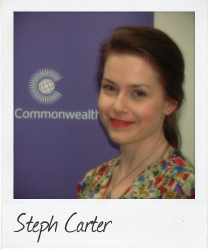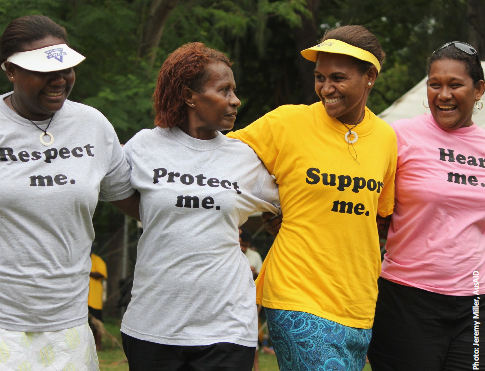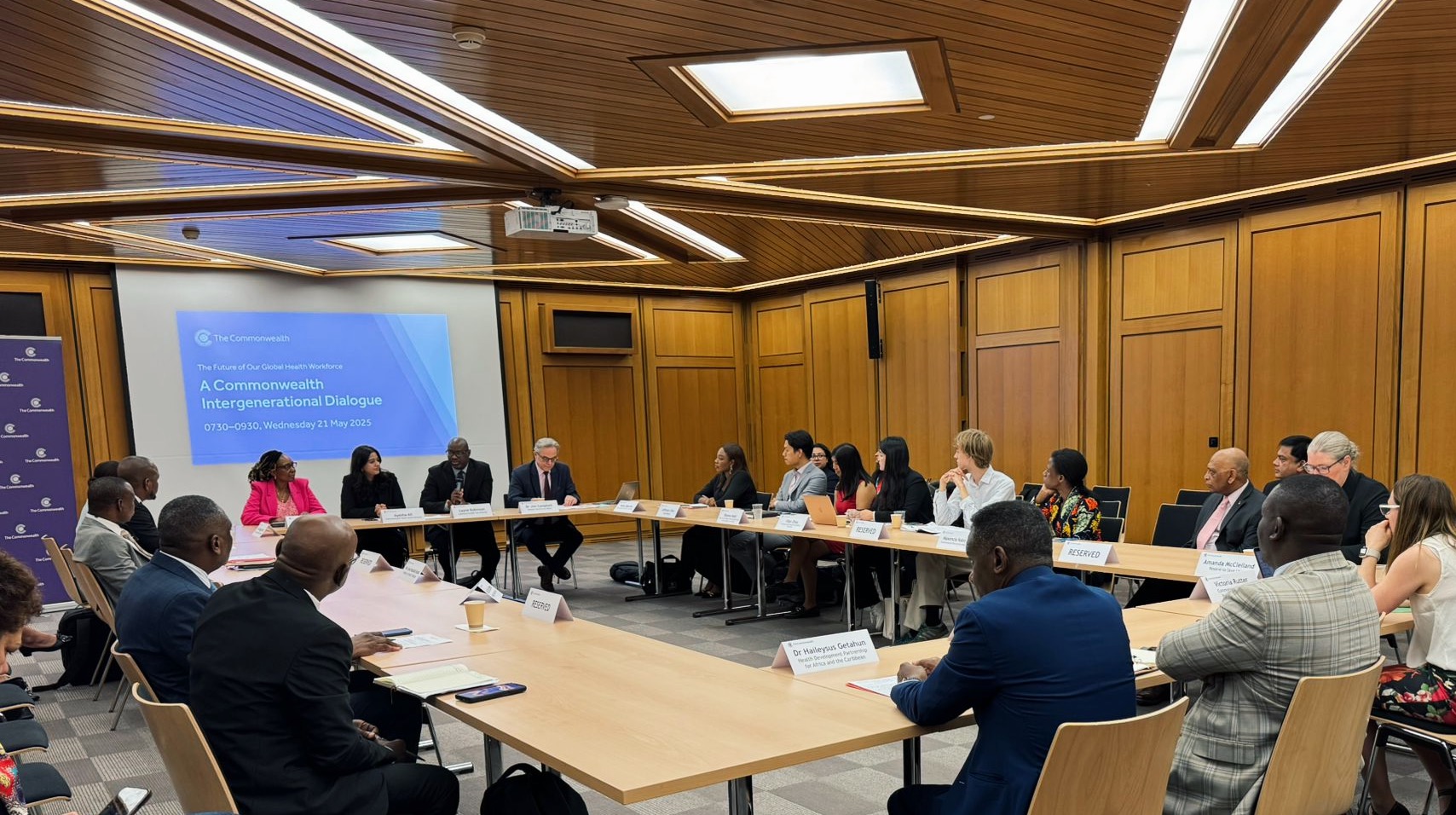SIDS 2014: "Gender inclusion in the Pacific: reimagining the #YesAllWomen message"
August 25 Small island developing states are especially vulnerable to external economic and environmental shocks. At the Third International Conference on Small Island Developing States in Samoa, 1-4 September, the Commonwealth is partnering with the United Nations, governments and international organisations to help build the resilience of these countries.
Small island developing states are especially vulnerable to external economic and environmental shocks. At the Third International Conference on Small Island Developing States in Samoa, 1-4 September, the Commonwealth is partnering with the United Nations, governments and international organisations to help build the resilience of these countries.
Gender issues are key to development goals, writes Stephanie Carter, 23, a Commonwealth Correspondent from Brisbane, Australia, as she describes how collaboration and social media can play a role in promoting equality.
In May 2014, the #YesAllWomen social media campaign took flight on Twitter, a grassroots response to the 2014 Isla Vista killings and other publicised acts of discrimination and gendered violence towards women. In a watershed moment, women globally used Twitter as a vehicle for revolutionising the way society talks about sexual discrimination and gender inequality. They raised awareness of women’s shared experiences, and quickly garnered international media attention. But as quickly as it had come, the #YesAllWomen conversation had gone out with the social media tide. Certainly, the conversation was over before many groups of women were able to participate, including those facing the most critical forms of social exclusion and disempowerment.
In the short-lived lifespan of #YesAllWomen, what activists may not have realised is that this message of gender equality feeds into a much broader global agenda of women’s inclusion in social and economic activities, particularly in the context of the developing world. As a young Australian reimagining the boundaries of the #YesAllWomen message for the post 2015 development agenda, nowhere is this more relevant than in our own backyard. For the small island developing states of the Pacific, the need for collaboration around gender equality and sustainable results is acutely felt.
For those small island developing states in the Pacific, including the likes of Papua New Guinea, Fiji, Solomon Islands, Vanuatu and Samoa, gender inequality remains a significant barrier to women’s participation in important political, social and economic domains. While this inequality varies across cultural contexts, its persistence is underpinned by the intersection of power dimensions with social norms, and a lack of policy commitment towards gender equity goals. Despite progress made under the Millennium Development Goals (MDGs), the 2012 Economist Intelligence Unit’s Women’s Economic Opportunity Index places both the Solomon Islands and Papua New Guinea (PNG) in the bottom five countries in the world. Female representation in Parliament sits at less than five per cent across the Pacific, and gender parity remains low in primary and tertiary schooling institutions. In addition, more than 60 per cent of Pacific women across four Pacific countries report physical and sexual abuse, with maternal health also ranking low by global standards. The end result of these inequalities and barriers to participation is a significant development challenge for many Pacific island nations.
It is no surprise that gender is purported as a vital fixture in the post 2015 global development agenda; it is key to addressing the unfinished business of the MDGs. Reflections from the OECD indicate that the post 2015 framework will retain a firm stand-alone goal on gender equality, holistically addressing inequalities in education, economic empowerment, access to healthcare, ending violence against women, leadership and participation in decision making.
Kate Butcher, a gender and social inclusion specialist working on sexual and reproductive health programmes in PNG for the past decade, says the discussion taking place around the post MDG development scenario is encouraging. She is also firm about the need for gender specific targets and indicators.
“Gender equality is critical. Having male champions for change in communities where men dominate is an essential ingredient for the longer-term transformation needed. We have to open up spaces for women to participate and act and speak out in the arena of development. The evidence is there: where societies or companies are more gender equitable, development outcomes – whether social or economic – are better and more sustainable,” she notes.
“By ensuring that indicators and targets are properly gendered, and that data is properly disaggregated, we will have a database which cannot be easily dismissed. Data is as powerful as its absence.”
Kate is also cognisant of the necessity for collaborative stakeholder partnerships in addressing women’s empowerment, particularly in the Pacific context. This applies to both development implementation and evaluation. Building on those partnerships forged under the MDGs, the need still exists for effective partnerships between Pacific small island developing states and civil society, government donors and the private sector. This includes support for women-led civil society groups and national women’s machineries in the Pacific.
As a dominant donor in the region, Australia’s push for a collaborative approach to improving gender equality in the Pacific is evidenced in their Pacific Women Shaping Pacific Development strategy. Committing $320 million over ten years, this program aims to improve the political, economic and social opportunities of Pacific women through partnerships with Pacific governments, local advocacy groups, the private sector, multilateral United Nations agencies and civil society organisations. Through these partnerships, the initiative will enhance policy engagement and development-programming choices across key areas including education, health and gender based violence. Regional activities include expansion of a safe markets program to improve infrastructure of produce markets to encourage women’s equal participation in local economies.
In a similar vein of collaboration, the Pacific Islands Forum Secretariat and their Strategic Partnerships and Coordination programme seeks to strengthen regional engagement around gender inequality and development outcomes. The programme works to develop sound social policy in support of gender equality, coordinating its integration into national and regional policies. In the post 2015 development agenda, this type of partnership will be key to ensuring inclusive, equitable and sustainable development.
“The new world order demands that we pay more attention to partnerships not just for efficiencies but also for effectiveness: governments, donors, non-state actors, the private sector – all have different comparative advantages and roles to play to achieve the social organisational and political transformation that gender equality demands. Maximising these advantages requires constant dialogue, compromise and creativity,” Kate says.
“Ultimately, it is the women and men [of PNG] who must decide how they will realise equal rights and gender justice, and it is the role of development partners including national governments to stimulate this discussion and to create safe spaces for it to occur.”
With preparations well underway for the 3rd Annual United Nations Small Island Developing States (SIDS) Conference to be held in Samoa next month, the spotlight will no doubt be on social inclusion and gender as a priority area. In achieving equitable outcomes for women in the Pacific, and indeed across SIDS, collaborative partnerships between governments and key stakeholders are essential in strengthening social inclusion policy and in building the capacity of institutions to deliver these policies. The time is ripe for a regional and global reimagining of the #YesAllWomen message, realising its potential for development outcomes at the individual and national levels.
#YesAllWomen- let’s continue the conversation.
SIDS 2014
Learn more about the Commonwealth’s role at SIDS 2014:
thecommonwealth.org/sids2014
Learn more about the conference:
sids2014.org
Join the conversation online:
Twitter: @commonwealthsec
Facebook: facebook.com/commonwealthsec
hashtags: #islands2014, #cwsmallstates, #commonwealth
…………………………………………………………………………………………………………………
About me:
I am 23, and currently work for GRM International on international aid programs. I am also studying a Masters of Business and Integrated Marketing Communications through Queensland University of Technology
…………………………………………………………………………………………………………………
Opinions expressed in this article are those of the author and do not necessarily represent the views of the Commonwealth Youth Programme. Articles are published in a spirit of dialogue, respect and understanding. If you disagree, why not submit a response?
To learn more about becoming a Commonwealth Correspondent please visit: http://www.yourcommonwealth.org/submit-articles/commonwealthcorrespondents/
…………………………………………………………………………………………………………………




